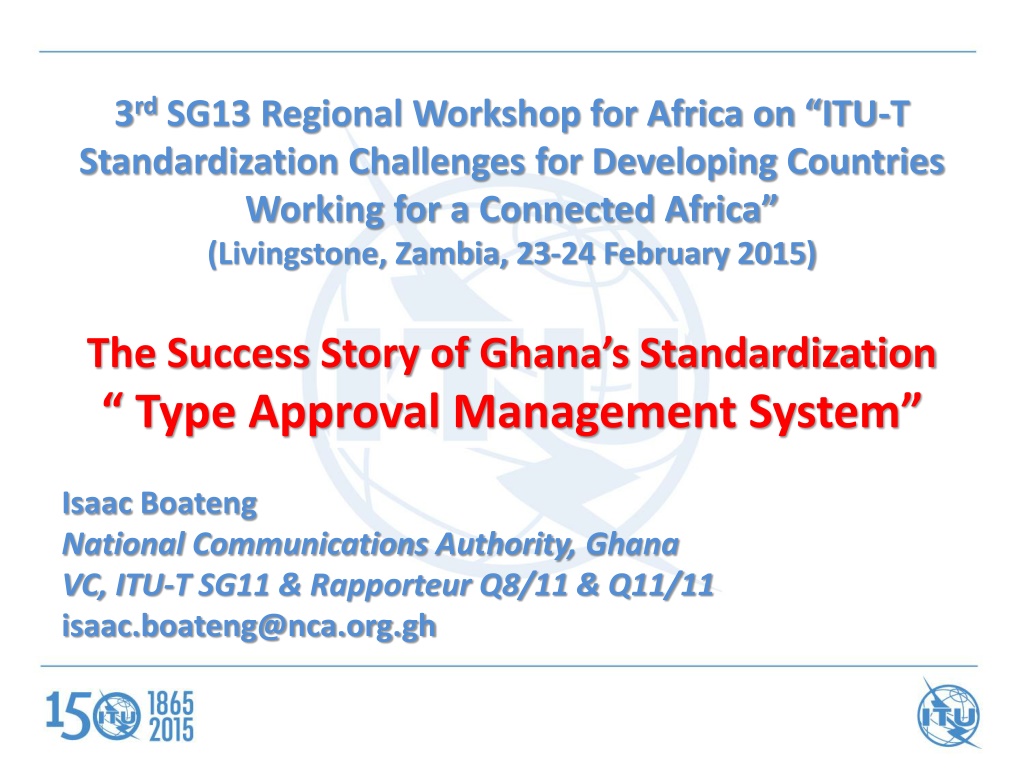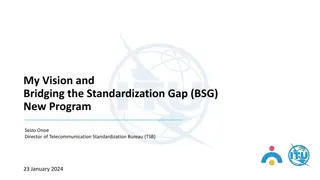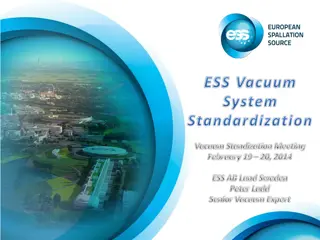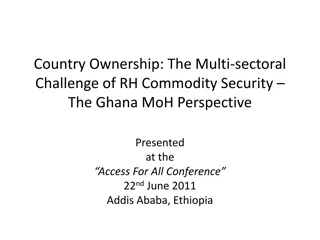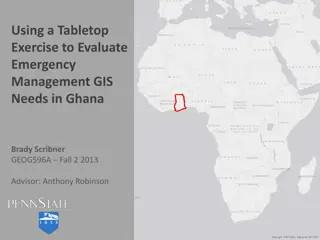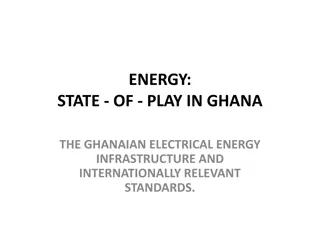Enhancing Standardization with Ghana's Type Approval Management System
Exploring the success story of Ghana's Standardization Type Approval Management System at the 3rd SG13 Regional Workshop for Africa. Isaac Boateng from the National Communications Authority shared insights on the technical and regulatory requirements, challenges, and the importance of Type Approval in ensuring compliance with essential standards for electronic communication equipment in Ghana. The system emphasizes regulatory compliance, market surveillance, and collaboration with key stakeholders to promote a connected Africa.
Download Presentation

Please find below an Image/Link to download the presentation.
The content on the website is provided AS IS for your information and personal use only. It may not be sold, licensed, or shared on other websites without obtaining consent from the author. Download presentation by click this link. If you encounter any issues during the download, it is possible that the publisher has removed the file from their server.
E N D
Presentation Transcript
3rdSG13 Regional Workshop for Africa on ITU-T Standardization Challenges for Developing Countries Working for a Connected Africa (Livingstone, Zambia, 23-24 February 2015) The Success Story of Ghana s Standardization Type Approval Management System Isaac Boateng National Communications Authority, Ghana VC, ITU-T SG11 & Rapporteur Q8/11 & Q11/11 isaac.boateng@nca.org.gh
Highlight Introduction Technical & Regulatory requirements The Type Approval Management System Challenges
Introduction Type Approval is proof by a manufacturer or its Authorized agent of a product that specific essential minimum technical and regulatory requirements related to the product have been fulfilled.
Regulatory Requirements Section 3 (n) of the NCA Act, Act 769 of 2008, sections 66 and 67 of the Electronic Communications Act, Act 775 are our Authority for Action Manufacturers or their Authorized Agents require Type Approval Certificate (TAC) before producing or assembling, or selling/using any Electronic Communication Equipment (ECE) in Ghana. Dealers are also required to deal in only type approved and genuine ECE. Approved Equipment models come with NCA Type Approval Certificate (TAC) with unique identity Importers must inform the NCA of any ICT equipment importation into the country for checks, TAC and final clearance
Regulatory Requirements TAC must always be visible and displayed to the public All communications equipment coming into the country must be inspected and passed by the NCA Destination Inspectors go to the point of entries for inspection Two levels of clearance Customs Clearance Regulatory Clearance Market Surveillance shall soon be an integral part of the process. Establishment of National ICT Task Force in collaboration with the security agencies and the Ghana Standard Authority through the GCAP.
Technical Requirements The minimum essential technical requirements: International, Regional and National Standards Environmental, Health and Safety Standards Proof of Genuineness Electromagnetic Radiation and Emissions Radio Frequency requirements Network Compatibility/Interoperability
Who Can Apply for TAC? Vendors and Assemblers; Dealers of ICT equipment for marketing/commercial use; Licensed Operators and Service Providers; Individuals or Companies wishing to import ICT equipment even for their own use;
Type Approval Management System Is a web tool developed with following main objectives; To serve as an application portal for Type Approval Certificate and Dealership Licence Secured and robust As database and search tool for NCA approved Devices Running on dedicated platform/infrastructure/servers To reduce the time of introduction of devices to market
Type Approval Management System APPPLICATION REQUIREMNTS Fill an online application form in addition to submission of following: Application Cover letter Technical Documentation /Technical Construction File A general description of the electronic communication equipment Design information /results of design calculations made A list of the adopted standards and/or other relevant technical specifications The declaration of conformity; Certificate of conformity from CAB; Test reports issued by accredited testing laboratories RF Test Report EMC Test Report Health and Safety Reports Sample of electronic communication equipment where necessary
Type Approval Management System Three stages of evaluation; Review Stage Comprehensive analysis and verification of submitted document including lab reports Verification Stage verification of review process, check lists and recommendation for approval where necessary Approval Stage Provisional Approval Final Approval Rejected
TAC Unique Identifier Type Approved Equipment models are now given unique identity marks on the Certificate ECE CC TAT IY SN NCA APPROVED: XXX - XX- XX- XXX ECE CC TAT IY SN : : : : ECE COLOUR CODE TYPE APPROVAL TYPE (modular or complete) ISSUE YEAR SEQUENCE NUMBER
Why TAC Unique Identity? To show that the Certificate is for specific equipment model/category/type ECE meets essential requirements of the Authority To provide public confidence Manufacturer s/Dealer s own declaration that ECE is genuine Manufacture/Dealer bears responsibility for any breach under which TAC was issued. If equipment is found to be Fake/Counterfeit If certain key functions (both software and hardware) of the ECE is altered
Challenges Current process is based on test results from vendor or recognized/accredited 3rd party testing Independent verification and market surveillance are required to provide assurance that the products category/model sold in the market have met the requirements of the Authority. Lack of testing labs, market surveillance & enforcement make it a challenge. Porous ports of entry and un-approved routes Vendors/Dealers/Consumers are still un-aware of the type approval regime Incomplete applications/ inadequate documentations
NCA Web Sources Related to Type Approvals portal.nca.org.gh www.nca.org.gh Type Approval Guidelines Contacts typeapproval@nca.org.gh isaac.boateng@nca.org.gh
